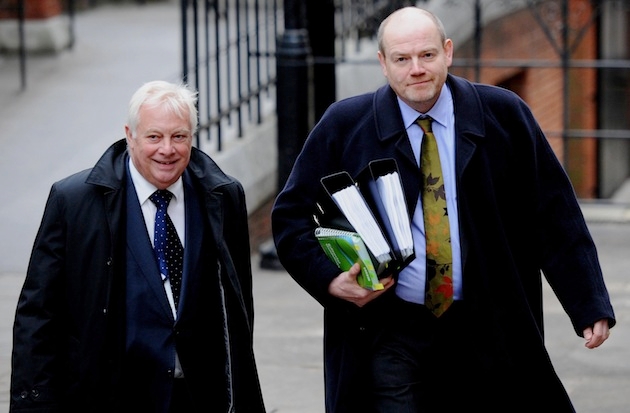Director of BBC News James Harding made a fascinating speech on Wednesday, setting out his mission statement for the Corporation’s newsroom:
‘Let’s start with holding people to account. In the offices of our local radio stations and regional TV operations – the places where the BBC does so much of its best work – we should play to that particular strength: accountability journalism.’
Mr S lives and breathes ‘accountability journalism’; it’s his eau-de-vie. But Harding seems to have a different understanding of the term than your humble correspondent.
You would never know it from BBC News (or, for that matter, Auntie’s in-house journal The Guardian); but Nick Pollard, who was paid the tidy sum of £96,000 and given £3 million to investigate why Newsnight’s investigation into Savile was shelved, has admitted that his report is flawed. Indeed, he has been recorded on tape accepting this error.
In the taped conversation, which has been heard by the BBC Trust, Pollard says that he was told during his eight-week inquiry by then head of BBC News, Helen Boaden, that she had, in December 2011, personally informed the then director-general, Mark Thompson, of the sex abuse allegations against Savile. Boaden’s testimony (which she confirmed to MPs at a later date) was sent to Pollard in a letter by Boaden’s lawyer five days before Pollard published his report on December 19 2012. It contradicted Thompson’s assertion to Pollard that he was unaware of the allegations against Savile until after he left the BBC in September 2012. Thompson has always maintained that he and Boaden had a ‘very brief conversation’ and that they have ‘slightly different recollections’ of it.
Strange though it may seem, Pollard neglected to mention Boaden’s account in his report. He has since recognised that this was an error. He said in the tape-recorded conversation: ‘It doesn’t particularly reflect well on me that I overlooked this in the report’. He added: ‘It’s a slightly awkward position for me because if I’d thought about it immediately before publication and I’d picked up on the significance of it I think I’d have probably put it in the report.’
This oversight not only threatens to undermine one of his report’s key conclusions, which was that he had ‘no reason to doubt’ Thompson’s version of events. It is also potentially damaging for BBC Chairman Chris Patten, who has been aware of Pollard’s self-confessed error for some time but has only just demanded an explanation.
Pollard’s confession — the latest twist in this long and winding saga — has been reported by James Harding’s old paper, The Times. And Harding knows all about the Savile scandal – including who knew what, and when – because The Times covered it extensively when he was editor. It has continued to do so since Harding left in December 2012. And ‘the paper of record’ is not alone: over the last nine months, the holes in the Pollard Report have been variously reported by the Spectator, the Mail on Sunday, the Telegraph, the Sunday Times, the Sun, the Evening Standard, the Press Gazette and Private Eye, and by the irregular press.
The broadcast media have been active, too. Well-respected, tenacious (and even left-leaning) journalists like Paul Mason and Michael Crick, both of Channel 4 News, have been digging. There has also been a parliamentary question and two Culture, Media and Support Select Committee hearings on the subject. Nonetheless, the BBC has been struck dumb by a story that most other outlets — and many parliamentarians — evidently see as a significant part of one of the darkest scandals in the BBC’s history.
Leaving the BBC’s prolonged silence to one side, Mr S is also intrigued by the fact that MediaGuardian has not (with the exception of a Roy Greenslade column about the Pollard affair in March) shown any interest in the Pollard story. There has not been a single mention of it anywhere on The Guardian website or in the paper. The idea that this intrigue is not of interest to The Guardian, which studies the media in more detail than any other paper, is frankly laughable. Is MediaGuardian, which once regarded itself as the industry’s noticeboard, not remotely curious about what is going on here? Or is this further proof, if proof were needed, that certain things are beyond reproach to the denizens of King’s Place?
And what of James Harding, who seems to have become as forgetful as Nick Pollard since he joined the Beeb? Harding told his staff on Wednesday:
‘Our response to Savile and McAlpine should not be that we shy away from investigative reporting and the coverage of difficult issues. In fact, we must renew our commitment to curious, inquisitive journalism in the public interest.’
Mr Steerpike could not agree more. Even if the Guardian won’t touch it, isn’t it time to address this ‘difficult issue’, Mr Harding?







Comments